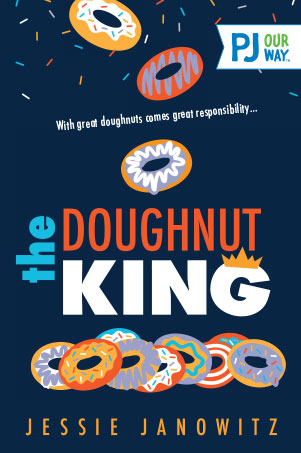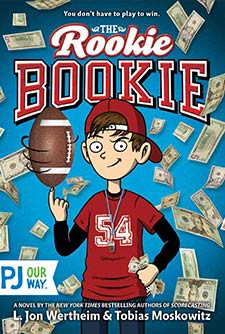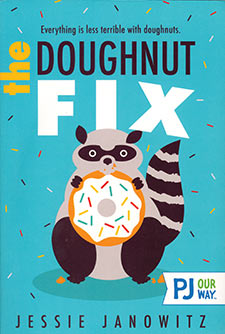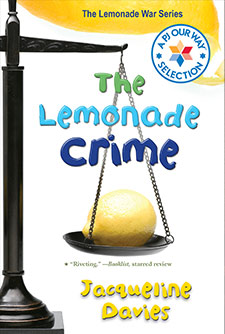The Doughnut King
Tris’s doughnut business is a huge success, but he can’t keep up with demand. Meanwhile, the small town of Petersville is getting even smaller… and might even disappear entirely. Winning a reality cooking show may be Tris’s only shot at saving his business and the town, but can he pull it off?
Average Rating
( hint: Login to leave a review! )
214 Reviews
Leave Review
What the Book Is About
Jewish Content & Values
Positive Role Models
Content Advisory
Talk It Over
More for You
What the Book Is About
Tristan’s doughnut business is doing well – perhaps a little too well! Tris and his partner Josh just can’t keep up with the demand for their tasty treats. Tris is sure that a Donut Robot will solve all their problems, but it costs $50,000! To top it all off, the small town of Petersville is losing residents and needs to attract more people. Tris reluctantly agrees to try out for a kids’ reality cooking competition because the prize money will be enough for the Donut Robot and the publicity could really help the town. When he’s offered a spot on the show, he wonders if it's because his mother used to work with the show’s host. But it soon becomes clear that Chef JJ isn’t doing him any favors. Even with the whole town counting on Tris, he’s not sure he can live with what it takes to win.
This Junior Library Guild Selection is the sequel to The Doughnut Fix but works well as a standalone novel.
This Junior Library Guild Selection is the sequel to The Doughnut Fix but works well as a standalone novel.
Jewish Content & Values
|
Positive Role Models
- Tris is a hardworking, creative boy who overcomes his social anxiety to appear on a reality cooking show in hopes of saving his business and his town. Tris is ultimately honest about a poor choice he made, and he works hard to repair the situation.
- Tris’s younger sister, Jeanine, is smart and innovative. She helps Tris manage his business and aspires to be a leader in her community someday.
- Keya is Tris’s main competitor on the show. She’s kind, supportive, hardworking, and interested in Yiddish when Tris teaches her about it.
- Tris's parents are supportive of their children’s dreams and are also creative and entrepreneurial in their own endeavors.
Content Advisory
None.
Talk It Over
The prize money from the reality TV show could really benefit Tris’s family, his doughnut business, and his entire community. Tris has an opportunity to cheat, which could help him win. What would you do if you were him?
More for You
Yiddish, a language derived mostly from German and written using Hebrew lettering, was historically spoken by over 10 million Ashkenazi Jews. In the wake of the Holocaust, Yiddish is primarily spoken amongst Hasidic Jews in the United States and Israel. However, there has been a resurgence of Yiddish recently, driven in no small part by the founding of The Yiddish Book Center in Massachusetts in 1980. The center currently houses more than a million Yiddish books as well as a wide range of other resources. In addition, Yiddish has become increasingly used in popular culture, including an all-Yiddish off-Broadway version of Fiddler on the Roof and the acclaimed Netflix television shows Unorthodox and Shtisel.
What the Book Is About
What the Book Is About
Tristan’s doughnut business is doing well – perhaps a little too well! Tris and his partner Josh just can’t keep up with the demand for their tasty treats. Tris is sure that a Donut Robot will solve all their problems, but it costs $50,000! To top it all off, the small town of Petersville is losing residents and needs to attract more people. Tris reluctantly agrees to try out for a kids’ reality cooking competition because the prize money will be enough for the Donut Robot and the publicity could really help the town. When he’s offered a spot on the show, he wonders if it's because his mother used to work with the show’s host. But it soon becomes clear that Chef JJ isn’t doing him any favors. Even with the whole town counting on Tris, he’s not sure he can live with what it takes to win.
This Junior Library Guild Selection is the sequel to The Doughnut Fix but works well as a standalone novel.
This Junior Library Guild Selection is the sequel to The Doughnut Fix but works well as a standalone novel.
Jewish Content & Values
Jewish Content & Values
|
Positive Role Models
Positive Role Models
- Tris is a hardworking, creative boy who overcomes his social anxiety to appear on a reality cooking show in hopes of saving his business and his town. Tris is ultimately honest about a poor choice he made, and he works hard to repair the situation.
- Tris’s younger sister, Jeanine, is smart and innovative. She helps Tris manage his business and aspires to be a leader in her community someday.
- Keya is Tris’s main competitor on the show. She’s kind, supportive, hardworking, and interested in Yiddish when Tris teaches her about it.
- Tris's parents are supportive of their children’s dreams and are also creative and entrepreneurial in their own endeavors.
Content Advisory
Content Advisory
None.
Talk It Over
Talk It Over
The prize money from the reality TV show could really benefit Tris’s family, his doughnut business, and his entire community. Tris has an opportunity to cheat, which could help him win. What would you do if you were him?
More for You
More for You
Yiddish, a language derived mostly from German and written using Hebrew lettering, was historically spoken by over 10 million Ashkenazi Jews. In the wake of the Holocaust, Yiddish is primarily spoken amongst Hasidic Jews in the United States and Israel. However, there has been a resurgence of Yiddish recently, driven in no small part by the founding of The Yiddish Book Center in Massachusetts in 1980. The center currently houses more than a million Yiddish books as well as a wide range of other resources. In addition, Yiddish has become increasingly used in popular culture, including an all-Yiddish off-Broadway version of Fiddler on the Roof and the acclaimed Netflix television shows Unorthodox and Shtisel.




